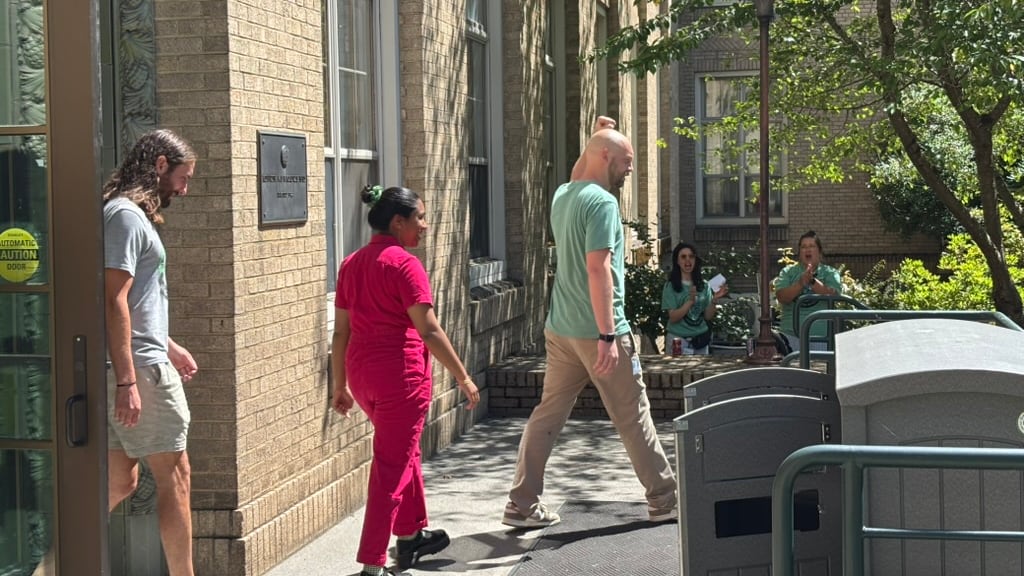On a sun-bathed quad at Oregon Health & Science University today, students and health workers in scrubs were lounging and lunching on the grass, or strolling to and fro. Nearby was a green tent, a pile of Hotlips Pizza boxes, and a rising din, produced by members of a nascent research workers’ union—representing some 1,800 OHSU staffers—who, as they seek a first contract, say they are displeased with the university’s recent offer.
They were chanting to fill some time before the return of the small delegation that had just entered Mackenzie Hall with a petition, which it planned to deliver to the new president of the institution, Shereef Elnahal. The delegation had promised to return promptly and report on how the visit went.
The basic issue at hand was money. Relations with the university had been cordial since Research Workers United, which formed in the spring of 2024, began its negotiations nearly one year ago, said Lynne Swarbrick, an OHSU senior research associate and member of the union bargaining committee. On some matters, the union and OHSU had even come to an accord, she said in an interview, noting an agreement a few months ago that she said gave members more permanent positions.
But then, around June, economic questions—wages and the like—entered the negotiation, and according to Swarbrick, the mood promptly shifted. Amid massive cuts in federal research funding, the university asked to pause negotiations while a dynamic financial climate could be assessed. Dubious that a favorable offer would be made after the hiatus, the union declined, she said, and soon the university came back with a proper contract proposal.
“I would not call it serious,” Swarbrick recounted, in a speech to the assembled. “What I would call it is better left unsaid.” She said the offer would have, among other things, given the union a 2% raise the first year and a 1.5% raise the next, with no guaranteed raise in the third. And then, on many noneconomic matters, she said, the university proposed to keep the status quo.
“If we wanted status quo, we wouldn’t have unionized,” Swarbrick said, her voice rising.
OHSU, for its part, said in an emailed statement to WW that it has a long-standing and productive relationship with its labor partner organizations.
“We value and appreciate the support all of these organizations provide their members in service to our patients, communities and to the advancement of scientific understanding as we navigate reductions in federal funding for research and health care,” the statement said.
Those funding reductions do loom large. Swarbrick, an OHSU staffer of more than two decades, said her lab, which seeks to cure and improve diagnostics for tuberculosis, is funded by the National Institutes of Health. The Trump administration gutted that agency in recent months. She said an ongoing grant will sustain the lab for a year or so, but beyond that, much is unknown, including, potentially, her own employment.
The swelling ranks of union members at Portland’s largest employer and the shutting off of the federal money spigot place university leaders in a squeeze.
Still, union members say, with so much of OHSU’s identity tied up in its research, it should be working harder to support its scientists.
Research Workers United formed officially in the spring of 2024, further bolstering the presence at OHSU of the American Federation of State, County and Municipal Employees, with which the new union is affiliated. AFSCME says it now represents some 11,000-plus workers at the institution.
Members of other of its locals spoke at the rally. James Jones, vice president of OHSU Postdoc Workers United, cautioned his research worker comrades against discouragement. He described his own union’s experience last year bargaining against the “stingy, strange, and seemingly unbudging upper management” on Pill Hill.
“When these suits pretended that they didn’t hear us, we threatened to strike,” he said, referring to the events of last August. “And then they folded immediately.”
A few minutes after disappearing into Mackenzie Hall to deliver that petition to the OHSU top brass, the union delegation emerged from the building. The waiting crowd ended their chants and clapped and cheered, expectant, and Wes Horton, a computational biologist and member of the bargaining committee, took the mic.
OHSU leadership was not delighted to see them, he reported. But he and the delegation did indeed meet with the university’s new president, Elnahal. “He was receptive, as people generally are in person,” Horton said. “So we’ll see what happens at the table tomorrow.”

